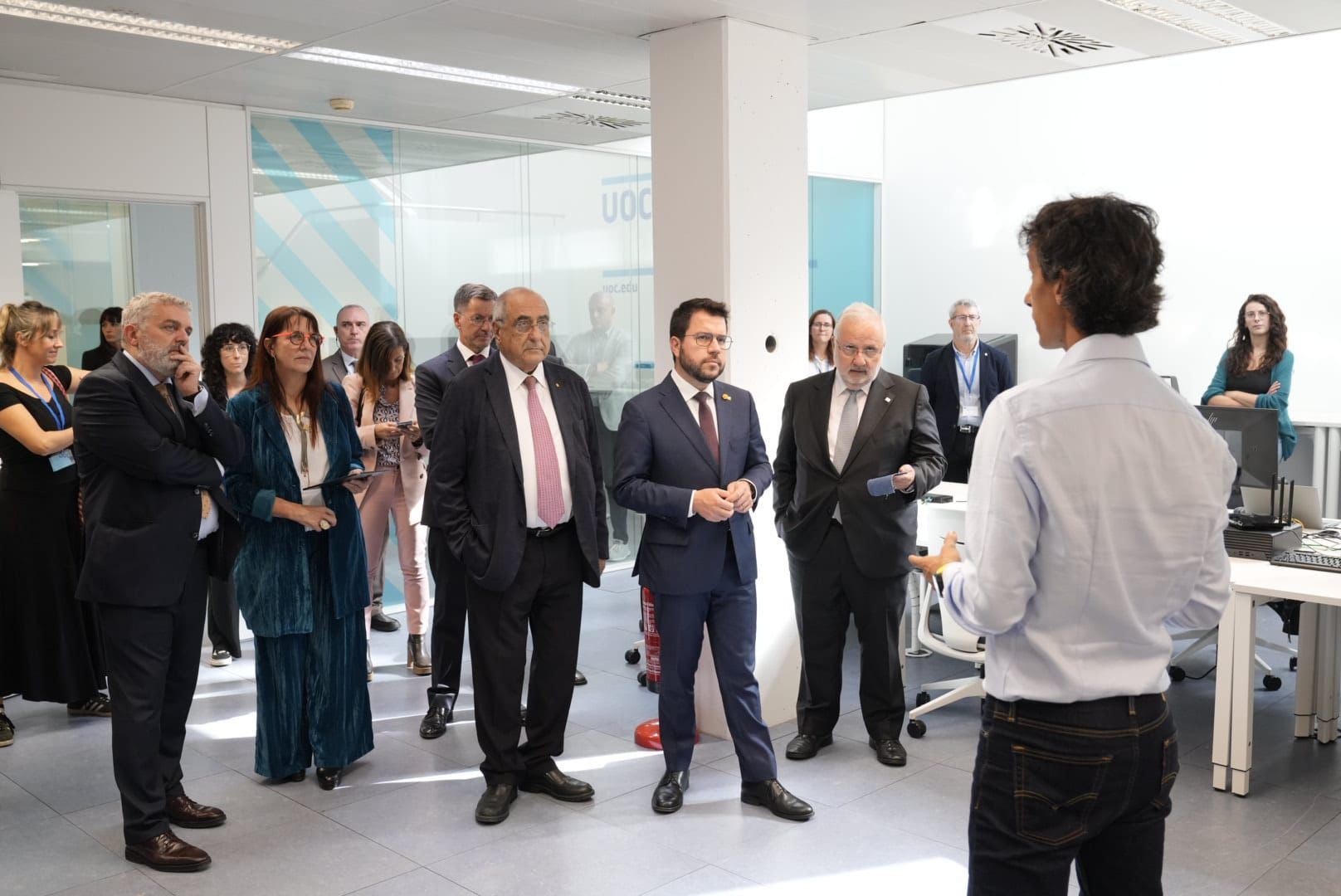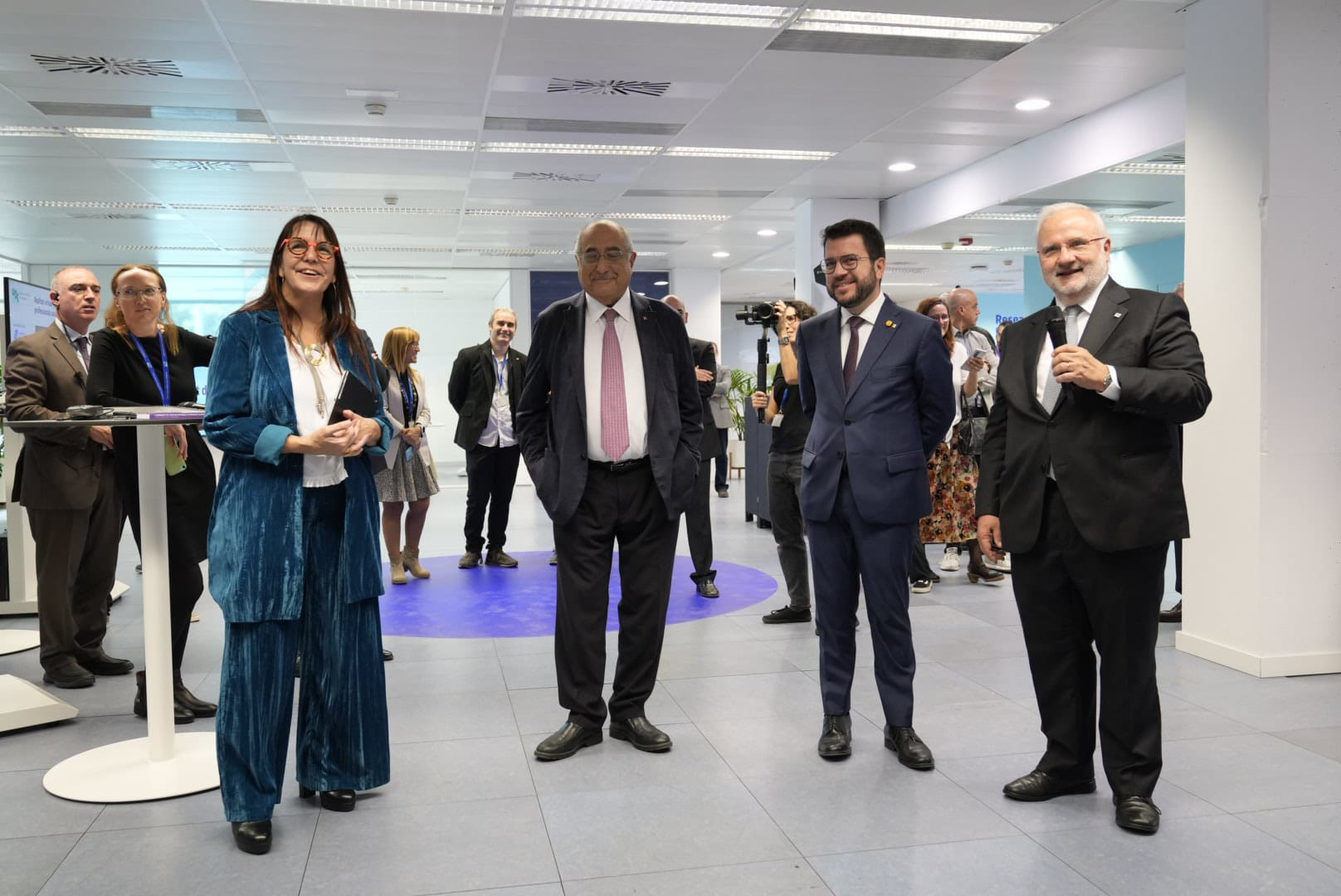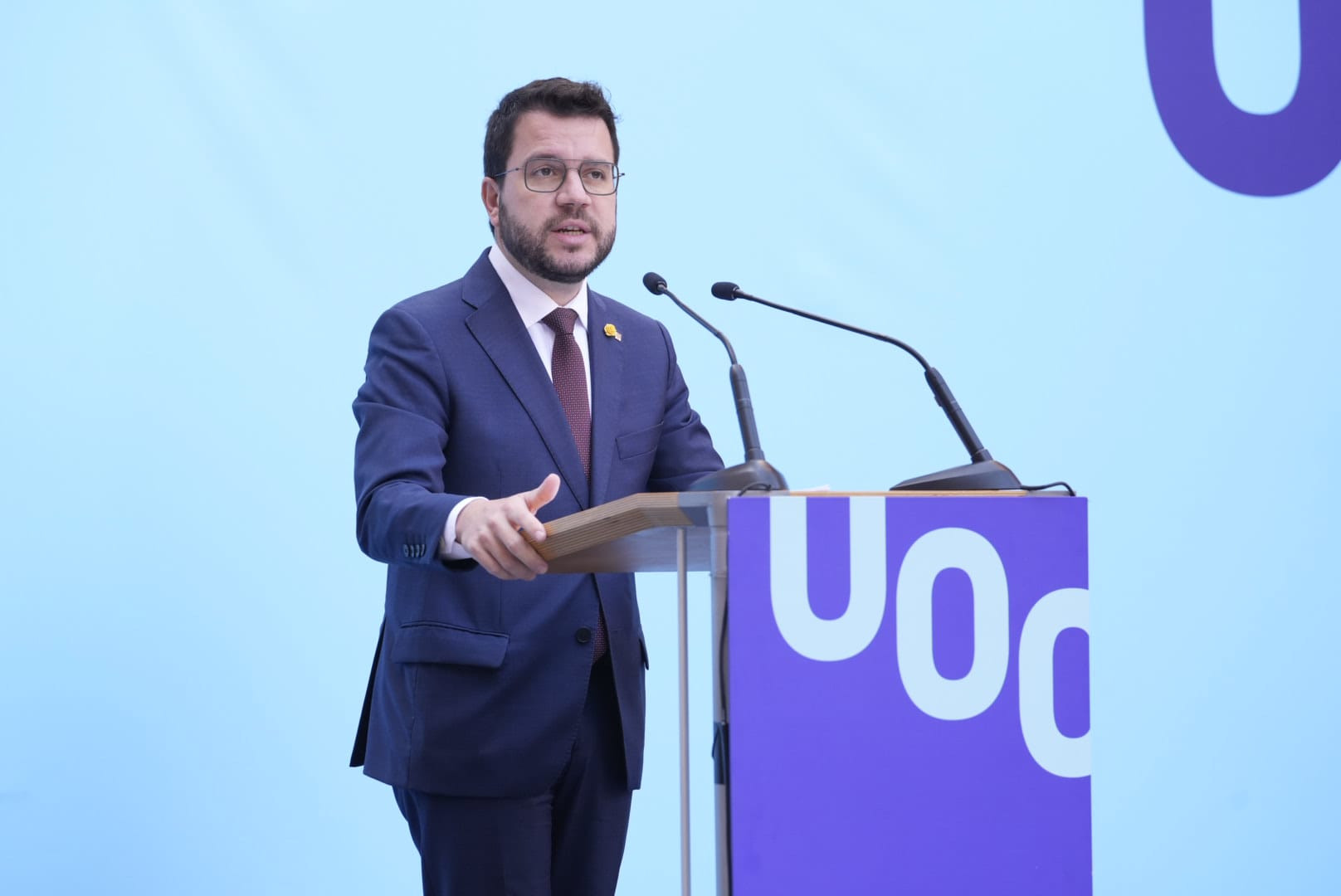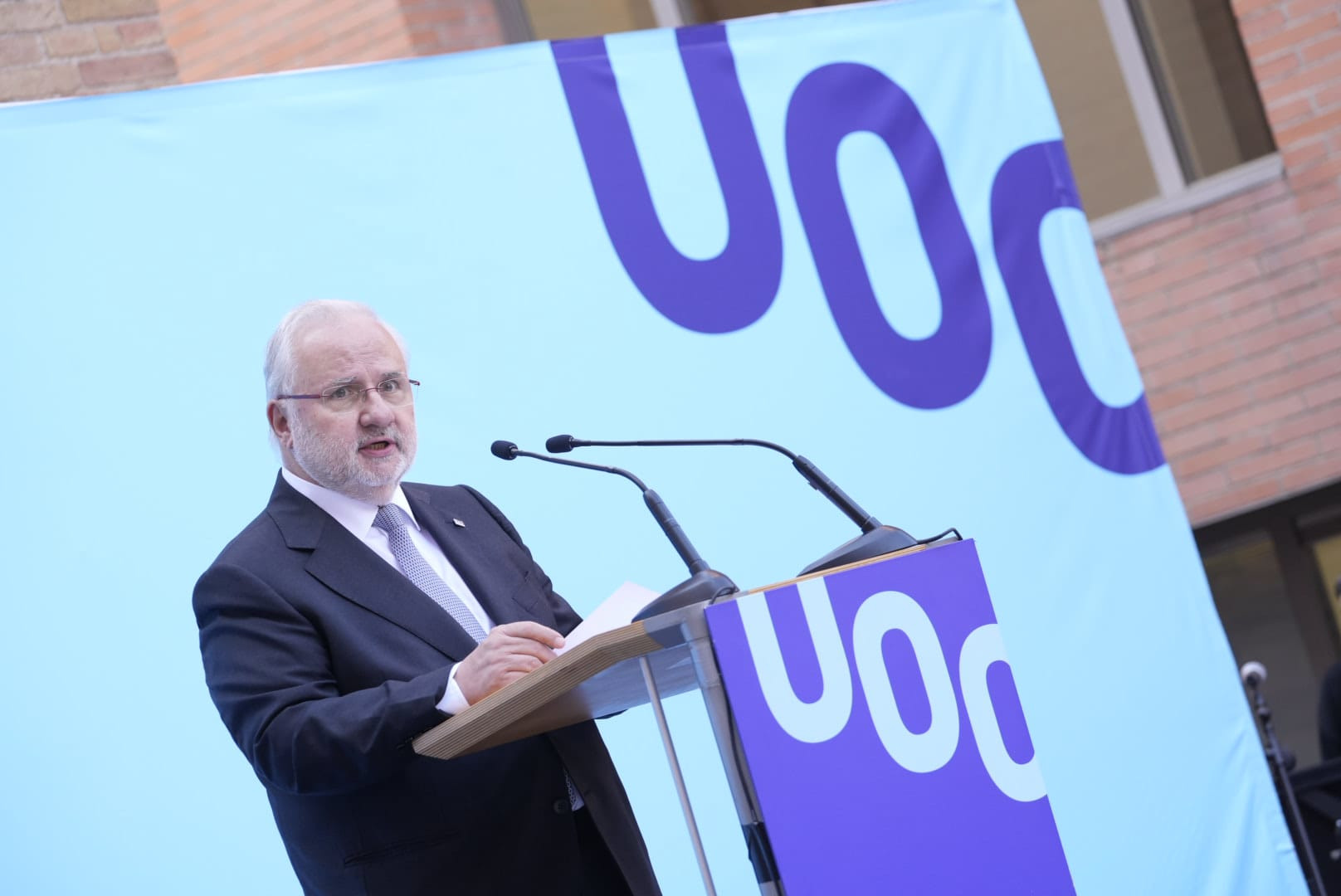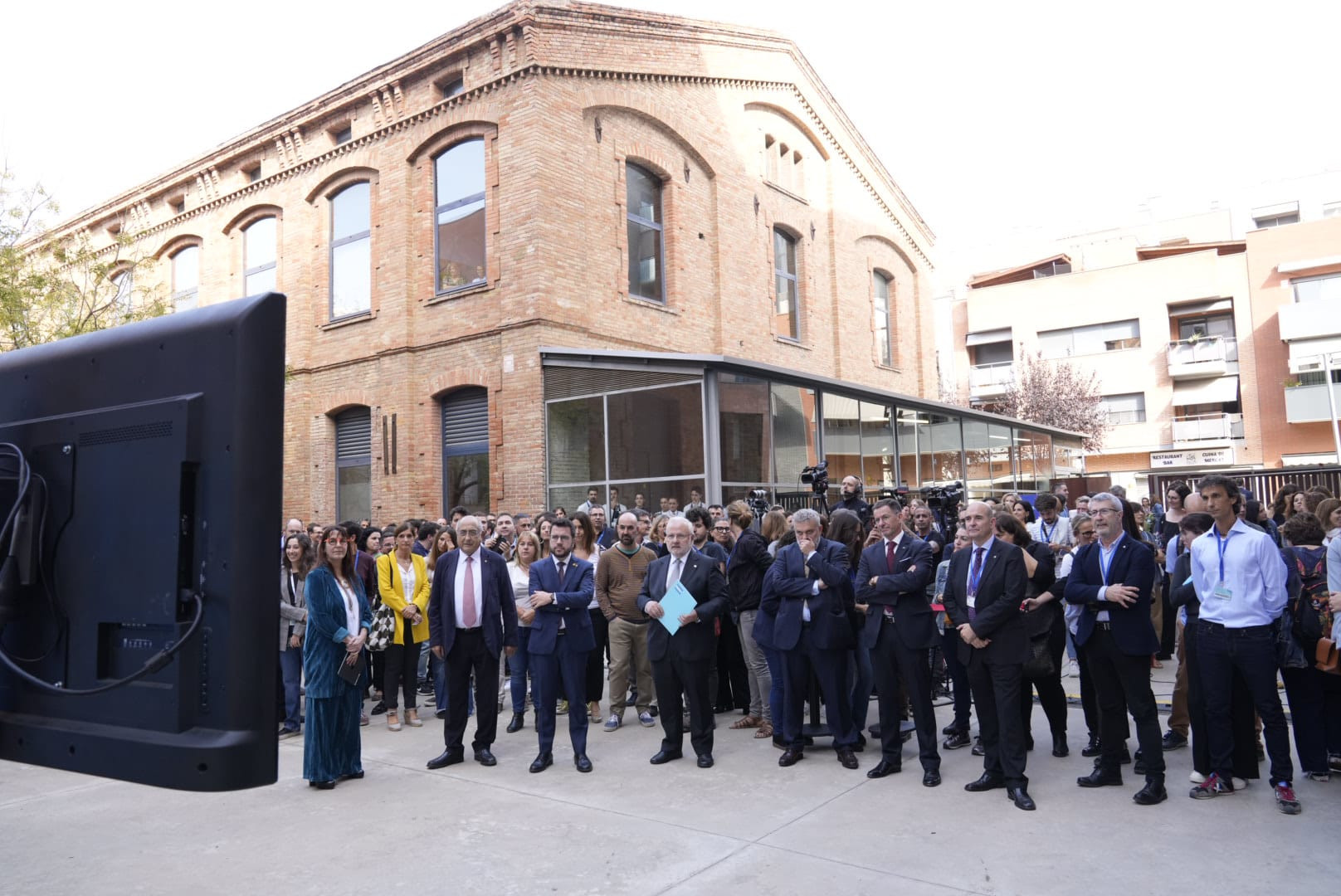President of the Government of Catalonia, Pere Aragonès, and UOC President, Josep A. Planell, inaugurate new UOC research hub in Barcelona's 22@ district
The 2,700 square-metre building is given over entirely to research and innovation and has been made possible thanks to co-funding from the Government of CataloniaWith the new building, the UOC is concentrating all of its academic activities and a large proportion of its administration on the Poblenou campus in Barcelona's tech district
Research at the UOC focuses on the challenges of a global and connected society in three areas: e-learning, digital health and the network society, with around a hundred projects ongoing
The President of the Government of Catalonia, Pere Aragonès, and the President of the Universitat Oberta de Catalunya (UOC), Josep A. Planell, today inaugurated the UOC's Interdisciplinary R&I Hub. This new 2,700 square-metre space is given over entirely to the research, innovation, knowledge transfer and entrepreneurship taking place at the university. The two presidents were accompanied by the Catalan Minister of Universities and Research, Joaquim Nadal, and UOC Vice President for Strategic Planning and Research, Marta Aymerich, as well as representatives from Barcelona City Council and various Catalan research organizations. The inauguration took place at 12 noon on 28 October.
President Aragonès emphasized that we should "take pride in the great potential that lies behind initiatives for centres such as the UOC'S Interdisciplinary R&I Hub – a centre that has everything to make knowledge flourish." The Catalan President stressed the value of the new complex as "it has all the tools to support collaborative work and first-rate research, sharing ideas, hypotheses and theories, and fostering collective intelligence."
"The UOC's Interdisciplinary R&I Hub is an incredible place to make knowledge flourish. But it's not just a place; it's a tool to leverage the knowledge that all of you bring," he said to those present. "I'm sure that projects and initiatives will come from this hub that will have an impact on our lives to build a fairer society, a society for everyone," he concluded.
The four-floor building located at Rambla del Poblenou 154 has been refurbished with €1.25 million of co-funding from the Government of Catalonia, from the programme for singular institutional R&D infrastructure projects. The facility is already home to the Interdisciplinary Internet Institute (IN3), eHealth Center (eHC), eLearning Research programme (eLR), Doctoral School, Hubbik platform for entrepreneurship and open innovation, and the research administrative staff. The nearly 600 people who will work there will also be able to use the facilities provided by the UOC Labs, an ecosystem consisting of nine laboratories for experimentation and cross-disciplinary and specialized services, including virtual reality, neurostimulation, social experimentation, 3D fabrication, audiovisual innovation, data architecture and cyber-physical systems.
"In this new space we will be fostering excellent interdisciplinary frontier research to provide solutions in three key global areas in which we have renowned expertise: e-learning, e-health, and the network society. We want research to remain a cornerstone of our university for the next 25 years," said Josep A. Planell.
Thanks to an agreement with Barcelona City Council in late 2020, the UOC has now been able to move its research and support groups from the Mediterranean Technology Park in Castelldefels to this new facility and bring together its teaching, research and a large proportion of its administration at the Poblenou campus. The campus is made up of three buildings in the complex located on the site of the former Can Jaumandreu textile factory, in Barcelona's 22@ tech district. The UOC also still has the building on Avinguda del Tibidabo, where the Office of the President is located.
"The concentration of teaching staff and researchers in a university and digital industry environment will facilitate synergies being created on many levels," said President Planell.
With this event, the UOC also concludes its celebrations marking 25 years since the university was founded.
Unique and outstanding research on the impact of technology
The research capacity of the UOC has greatly increased in recent years. It has grown in terms of the number of researchers, research groups, projects and knowledge transfer, and its ability to attract external funding and international collaborations. The UOC now has 51 research groups and 577 people working on research and innovation, an increase of 41.77% compared to 2014. The competitive funds it was awarded tripled in the seven years between 2014 and 2021, to €6.6 million. The number of its scientific articles published also tripled in the same period (to 642 in 2021), and 44.08% of those were international collaborations. In terms of knowledge transfer, in 2021 the UOC had 21 patents and had founded 4 spin-off companies (17 and 3 more than in 2014, respectively). Today, the UOC has a hundred ongoing research projects that are being carried out with Spanish and international competitive funds. The delegation led by President Aragonès was able to see some of these projects at first hand.
A living online learning lab: e-learning
The UOC's Virtual Campus, with more than 87,000 active students around the world, is a unique, real environment for ICT-based teaching and learning processes. It is a living laboratory enabling advanced research on big data and online learning. It is closely linked to the eLearning Innovation Center (eLinC), which works towards the evolution of the university's educational model. This need for research on a learning model that has grown and spread around the world in the wake of the COVID-19 pandemic is more acute today than ever.
The university has launched a specific programme to promote research in e-learning, which covers twenty research groups and has led to the publication of over 800 scientific articles on this subject. Furthermore, the launch of the Data Science Lab, one of the nine laboratories, will provide researchers with software, hardware and data architecture specialists to make a leap forward in the conceptualization, use and exploitation of big data.
One example is the project led by Montse Guitert and Teresa Romeu, researchers in the Edul@b group in the Faculty of Psychology and Education Sciences, which uses big data to improve online monitoring of students. Edul@b has developed a learning analytics tool that analyses interactions in the virtual classrooms, which has led to a one-point increase in students' average marks, and a 6% decline in dropout rates. This project is now being expanded with the support of the Spanish Ministry of Science and Innovation to leverage the use of learning analytics. This three-year research project is being led by the UOC and involves seven other Spanish and international universities.
Another type of e-learning that is gaining momentum is that which employs virtual reality (VR). This training is provided by the UOC spin-off company Immersium Studio, which was founded five years ago, and is headed by Luis Villarejo. At the height of the pandemic, and faced with a lack of healthcare professionals in ICUs, they worked with the European Society of Intensive Care Medicine (ESICM) to provide over 20,000 healthcare professionals all over Europe with remote training using VR. They received the Auggie Award for this programme for the Best Healthcare Virtual Reality Solution of 2021. Today, Immersium Studio is training groups working in the healthcare sector to identify and address gender violence and on how to pass on bad news. They are also starting immersive training projects with the United Nations and Doctors Without Borders.
Emotional robots and a great deal more besides: digital health
Digital health is another cornerstone of research at the UOC. It is focused around the eHealth Center (eHC). It was established in 2017 as an academic centre that is open to the world and now has some sixteen research groups. The UOC has been a WHO Collaborating Centre for Digital Health since 2018, and it reaffirmed this commitment in 2022. Research in digital health investigates how digital technologies can contribute to improving individual and collective health and well-being, while contributing to greater knowledge and improved decision-making capacity about our own health.
Digital health represents a window of opportunity for health. It is a constantly evolving concept that includes many variants: eHealth, big data and artificial intelligence, and it focuses on three main areas: on how the user interacts with technology to monitor, track and stay informed about their health; on how digital technologies improve communication and interaction between carers, patients and citizens; and how data are stored, managed and analysed to provide immediate support in decision-making and more personalized and focused care. The UOC conducts research in these areas to overcome the challenges involved and to move forward with technology towards a new healthcare management model and towards more personalized, participatory, predictive and preventive medicine.
An example of research at the intersection of technology and health is that conducted by the Artificial Intelligence for Human Well-being (AIWELL) group led by Àgata Lapedriza, a research affiliate at MIT in Boston since 2012. Lapedriza, an expert on artificial intelligence and affective computing, has a social robotics project under way which applies her research to improving communication between social robots and people. Among other areas, this research is important in the development of care robots as they look to create one that can help older people living alone and contribute to their cognitive and social stimulation.
A globalized, sensorized and interconnected society: the network society
The Internet Interdisciplinary Institute (IN3), which was founded 22 years ago, brings together the UOC's expertise in studying the interaction between technology and society. Its ten groups analyse the internet of the future, and propose solutions based on technology for the challenges of a globalized, sensorized and interconnected society. This has an impact on all areas: the economy, industry, information, law, equality, the environment, politics, the arts, etc.
One example of the research is that being conducted by Xavier Vilajosana, the principal investigator in the Wireless Networks Research Lab (WINE) group. Vilajosana works in the area of cyber-physical systems – the electronic systems that make it possible to digitize the world. They provide technological solutions in areas including industry, energy efficiency and the circular economy. His group has developed a technology for precise positioning in indoor spaces, which impacts automation of processes in the industrial sector, robotics and logistics management. This technology improves the management and automation of processes and the location of objects or people in a non-intrusive way by incorporating a Bluetooth-equipped device into the object to be tracked.
The group also has two patents for another technology that involves a disruptive change in our understanding of digitalization. They are developing battery-free sensors that cost less than ten cents, can be integrated into any surface (paper, plastic, fabrics, etc.) and can be read remotely and wirelessly. This development has led to collaboration with MIT in Boston, and they have carried out several proof-of-concept tests with an automotive company in Catalonia.
More open, more feminist
The UOC has had an Open Knowledge Action Plan in place since 2017, which was strengthened and extended with the Open Knowledge Policy in 2021. The university is aligned with the United Nations 2030 Agenda, and is committed to making knowledge available to everyone. In this respect, 70% of UOC academic articles are available in open access, a figure above the Spanish average of 61%, according to the Conference of Rectors of Spanish Universities (CRUE) report, Measurement of Open Access in Spanish Universities and the Spanish National Research Council (2016-2020).
The UOC understands that the way research is assessed is crucial for promoting open science and believes that research assessment needs reform. In 2019, the university signed the San Francisco Declaration on Research Assessment (DORA), an international movement that calls for research assessment based on the quality of the research itself rather than on the reputation of the journals in which it is published.
In terms of gender equality, one of the most active and prolific groups is the Gender and ICT (GenTIC) group led by Milagros Sainz. They are leading the way internationally in the analysis of the situation of women and girls in science. The group's Rachel Palmén is coordinating the Inspire project, which officially began on 1 October, with fourteen other partners in Europe and Latin America to create the European Centre of Excellence on Inclusive Gender Equality in Research & Innovation. They have been awarded €5 million over four years to undertake the actions required to make European science and research more inclusive.
UOC R&I
The UOC's research and innovation (R&I) is helping overcome pressing challenges faced by global societies in the 21st century, by studying interactions between technology and human & social sciences with a specific focus on the network society, e-learning and e-health.
The UOC's research is conducted by over 500 researchers and 51 research groups distributed between the university's seven faculties, the E-learning Research programme, and two research centres: the Internet Interdisciplinary Institute (IN3) and the eHealth Center (eHC).
The University also cultivates online learning innovations at its eLearning Innovation Center (eLinC), as well as UOC community entrepreneurship and knowledge transfer via the Hubbik platform.
The United Nations' 2030 Agenda for Sustainable Development and open knowledge serve as strategic pillars for the UOC's teaching, research and innovation. More information: research.uoc.edu #UOC25years
Press contact
-
Editorial department

